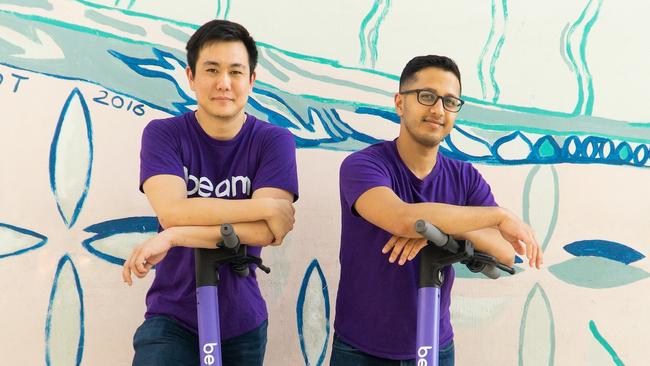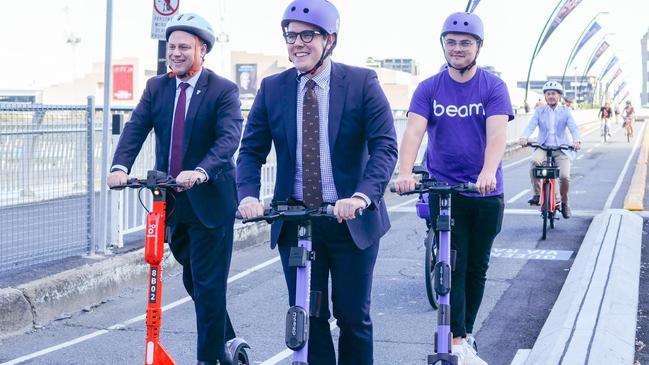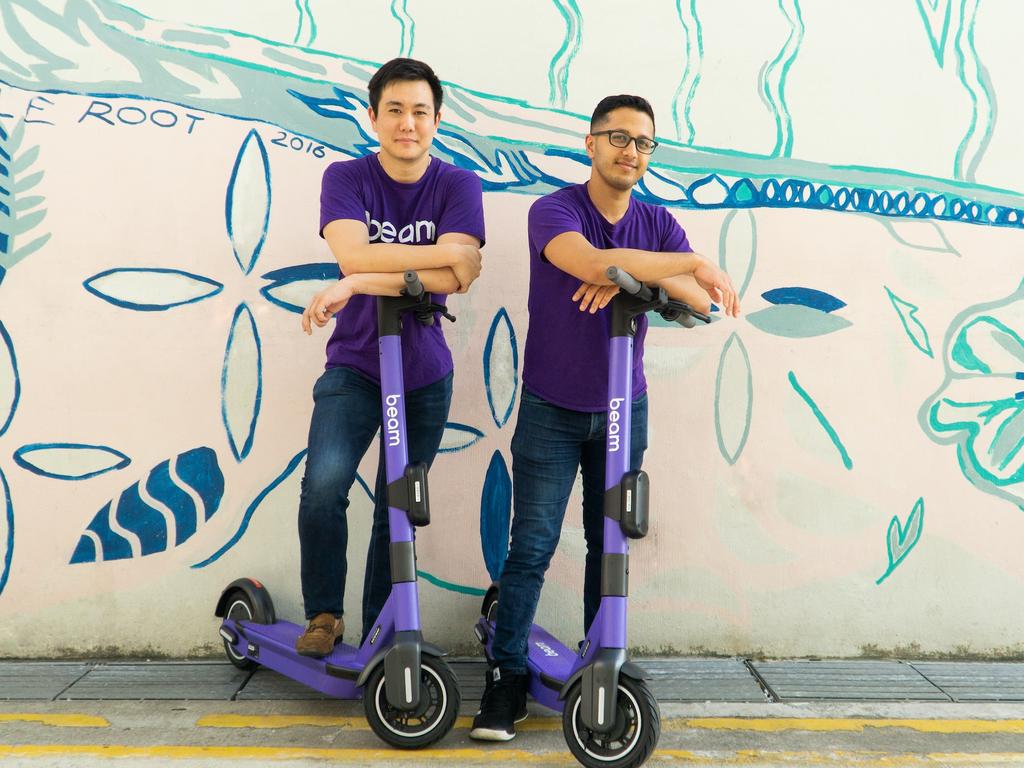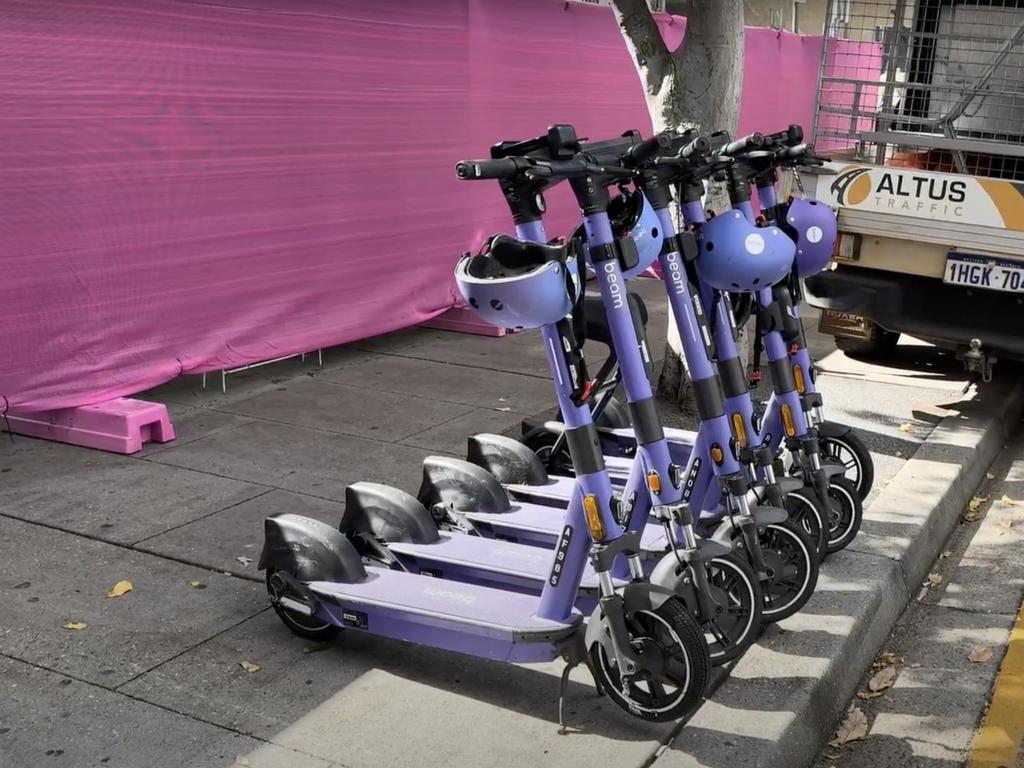Beam offers compo to ripped-off councils after scooter scam
A global e-scooter firm has quietly offered financial settlements to local governments in Australia and New Zealand after being exposed running an alleged scam.

Global e-scooter firm Beam Mobility has quietly offered local governments in Australia and New Zealand financial settlements after the company was caught running an alleged scam to cheat councils out of hundreds of thousands of dollars in cash and subvert safety caps.
Local authorities in Brisbane, Canberra, Townsville, Auckland and Wellington all dumped the Singapore-based operator after The Australian exposed Beam’s so-called Running Hot Project, a co-ordinated strategy to deploy hundreds of unauthorised scooters on the streets of those cities to generate an estimated $150,000 extra in profit a month.
Leaked internal correspondence – including messages from Beam’s internal “war-room” Slack chat – revealed the deliberate manipulation of data supplied to an independent monitoring app that tracked the number of vehicles in each affected city and riders’ trips.
Beam went into damage control after the Running Hot Project was uncovered. The company was “deeply apologetic” but did not intend to exceed “vehicle allocation … We emphatically reject any suggestion this was a ‘scheme’ to deprive councils of revenue,” Yale-educated co-founder Alan Jiang told The Australian in August.
But now, after the company commissioned an independent analysis into the “over-deployment” by advisory firm Pitcher Partners, The Australian can reveal Beam’s lawyers Corrs Chambers Westgarth have offered financial compensation to local governments in Brisbane, the Australian Capital Territory, Auckland, and Wellington.
A Beam spokeswoman said once the settlements had been finalised and a separate review of corporate governance was finished, a governance report with recommendations would be made public.
“We regret and acknowledge the seriousness of the nature of this over-deployment, and are determined to use these learnings to make our relationships stronger, our operations more transparent, and our business an overall better and more credible partner for all stakeholders,” she said.
“As is the nature of an independent analysis, the advisory firm and legal counsel are running their respective processes, and we are taking great care to ensure the output is considered and collaborative. The process is well under way and Beam has delivered settlement offers to almost all affected councils with remaining offers to be delivered immediately.”

A Brisbane City Council spokeswoman said the agreement with Beam had just been finalised and the “payment will be made this year”.
“The settlement is commercial in confidence, but council is satisfied with the settlement and can assure ratepayers they are not out of pocket,” she said.
An ACT government spokesman confirmed it had received both a compensation offer from Beam’s lawyers, Corrs Chambers Westgarth, and a report from Beam’s independent auditors, Pitcher Partners, “acknowledging Beam’s over-deployment of their e-scooters in Canberra”.
“The ACT government is investigating (the compensation offer) and will be responding to it in due course,” he said.
An Auckland Council spokeswoman said the council had rejected Beam’s confidential settlement offer, after referring the matter to the police in late August.
The Australian understands that of the 31 councils reviewed so far by Pitcher Partners, 25 were found to have no excess deployments.
Two more councils are being analysed.
Beam’s scooters were taken off the streets in the New Zealand cities of Porirua and Taupo late this year, but both councils have confirmed that was the decision of the operator and was not related to the alleged scam.
A spokesman for Wellington’s Porirua council said it had received the independent investigation report in early November “which showed that Beam did not breach the agreed e-scooter cap in Porirua City,” he said.
Beam – which bills itself as Asia Pacific’s leading micromobility company – still operates in more than 20 cities and towns in Australia and New Zealand, including Sydney, Adelaide, Perth, Darwin, Hobart, Launceston and Queenstown, as well as locations in the US, Turkey, South Korea, Indonesia and Malaysia.






To join the conversation, please log in. Don't have an account? Register
Join the conversation, you are commenting as Logout